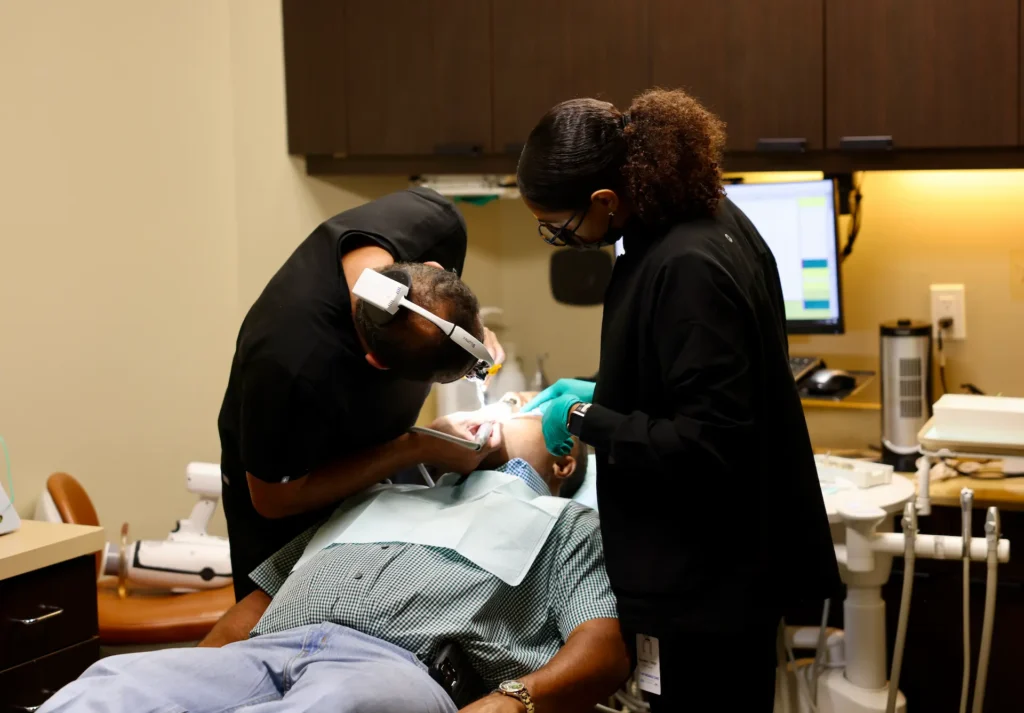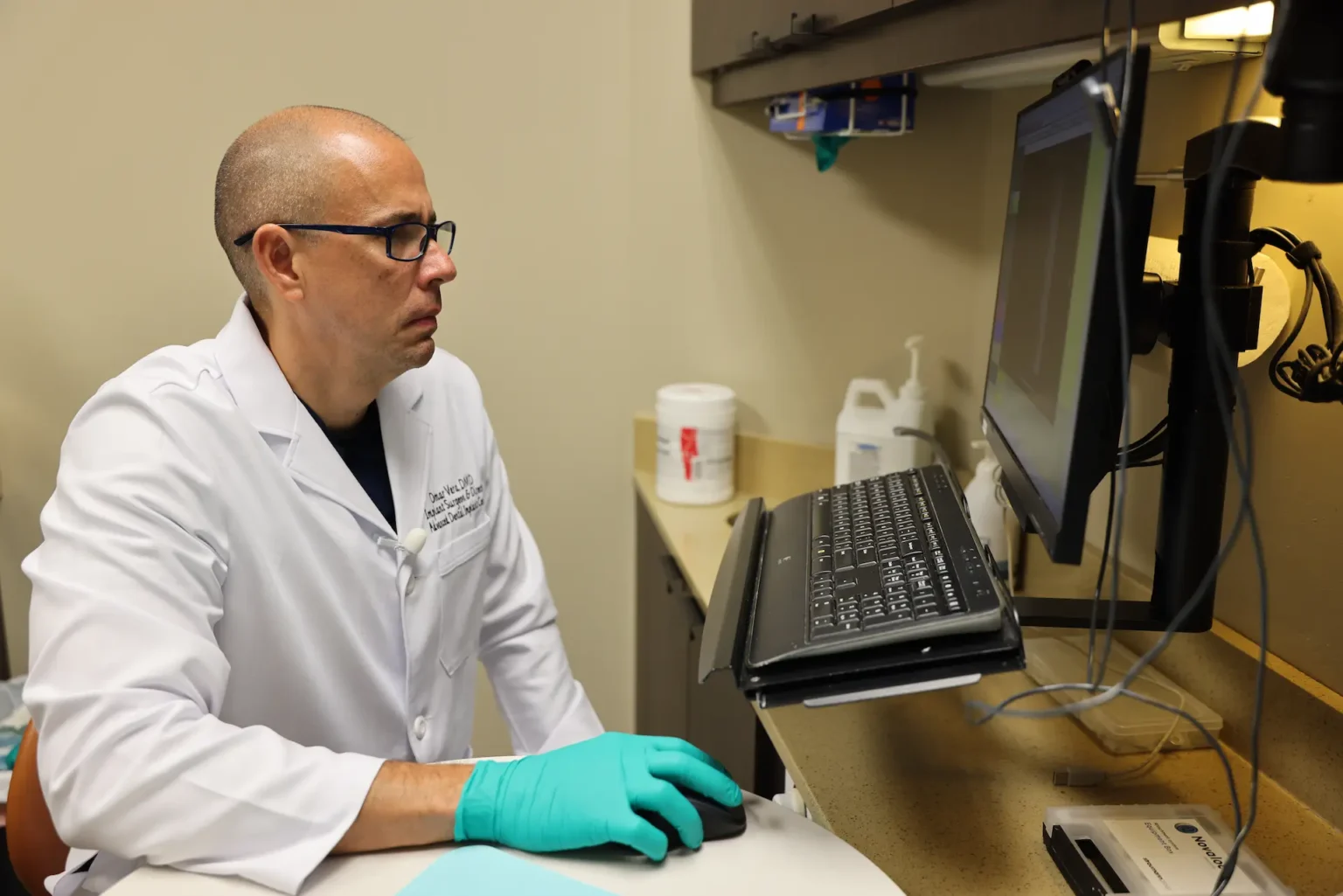You are never too old to get dental implants.
But did you know that by the age of 74, over 26% of adults have lost all their teeth. Tooth loss is more than a cosmetic issue—it affects chewing, speech, and even long-term oral health. If you’re missing teeth, you might be wondering:
Am I too old for dental implants?
The simple answer is no. Age alone does not disqualify you from getting implants. In fact, many patients in their 70s, 80s, and even 90s receive dental implants successfully. The real factors that matter are your overall health, bone density, and ability to heal after surgery.
Advancements in implant dentistry mean that even patients with low bone volume or certain medical conditions can still qualify. With options like teeth in a day, you can even get implants and temporary teeth in just one visit.
If you’ve been told you’re too old for dental implants, you might have been misinformed. Keep reading to learn why age isn’t a barrier—and how dental implants can improve your life at any stage.
Key Takeaways
- There is no such thing as being too old to get dental implants. Older adults, including those in their 70s, 80s, and 90s, can successfully receive implants.
- Your overall health matters more than your age. If you are healthy enough for routine dental procedures, you are likely a good candidate.
- Bone loss is not always a barrier. Treatments like bone grafting and sinus lifts can make implants possible even with low bone density.
- Same-day dental implants are available. With advancements in implant technology, you can receive implants and your final teeth on the same day.
- A consultation is the best way to know if implants are right for you. At Hanna Dental Implant Center, we assess your health and create a plan to restore your smile—no matter your age.
What Determines If You’re a Good Candidate for Dental Implants?
Not everyone starts as the perfect candidate for dental implants, but at Hanna Dental Implant Center, we make it possible for just about anyone. If you have health concerns, low bone density, or other challenges, we create a plan to prepare you for successful implant placement. Here’s what we evaluate and how we help.
General Health
Your overall health plays a role in healing after implant surgery. Conditions like diabetes, heart disease, or osteoporosis don’t automatically disqualify you. We work with your medical team to ensure these conditions are stable and that you can heal properly after the procedure.
Bone Health and Jawbone Density
If you have bone loss, we restore your jawbone with bone grafting or sinus lifts to create a solid foundation.
Gum and Oral Health
If you have gum disease, we treat it first to create a stable environment for your implants. Routine cleanings and personalized oral care plans help keep your gums in top shape before and after the procedure.
The Benefits of Dental Implants for Older Adults

Missing teeth can make everyday tasks harder. Eating certain foods, speaking clearly, and smiling with confidence may not feel the same. Dental implants help older adults regain these functions and offer benefits that go beyond appearance.
Strong and Permanent Solution
Dental implants stay in place. Unlike removable options, they don’t shift when you eat or talk. Once healed, implants function like natural teeth, letting you chew comfortably without worry.
Improved Nutrition and Health
Tooth loss can limit what you eat. Hard or chewy foods may feel impossible with missing teeth. Dental implants restore bite strength, allowing you to enjoy a wider range of foods. Eating a balanced diet helps maintain overall health, especially as you age.
Protects Jawbone and Facial Structure
When you lose teeth, the jawbone under them starts to shrink. This can change your facial shape over time, making the cheeks appear sunken. Implants prevent bone loss by stimulating the jaw, keeping it strong and preserving your natural facial structure.
Clear Speech and Better Comfort
Gaps in your smile or loose dentures can make speaking difficult. Words may not sound as clear, and you might feel self-conscious. Dental implants support natural speech and stay in place, so you can talk with confidence.
Long-Lasting Results
Dental implants are built to last. With proper care, they can stay in place for decades. Regular brushing, flossing, and dental check-ups help keep them in top condition.
Boosts Confidence
Your smile affects how you feel. Missing teeth may make you hesitant to laugh, speak, or take pictures. Dental implants restore your smile, helping you feel more like yourself again.
What to Expect During the Dental Implant Procedure (For Older Adults)
Getting dental implants is a multi-step process, but it’s designed to be safe and comfortable. If you’re an older adult considering implants, knowing what to expect can help you feel confident about your decision.
Initial Consultation
The first step is a detailed evaluation. At Hanna Dental Implant Center, we:
- Review your medical history to design the best implant treatment procedure for you.
- Take 3D scans to check bone density and jaw structure.
- Discuss your treatment options.
If you need additional procedures, like bone grafting, we plan them to ensure the best outcome.
Surgical Placement
On the day of surgery, we:
- Ensure your comfort with a variety of sedation options.
- Place titanium or zirconia implants into the jawbone.
- Attach the abutment and restoration.
The procedure is minimally invasive and takes a couple hours with patients heading home with a brand new smile.
With today’s advancements, you don’t have to wait months for your final teeth. At Hanna Dental Implant Center, we use state-of-the-art technology to provide your permanent restoration on the same day your implants are placed.
Your final teeth are custom-made to match the size, shape, and color of your natural teeth. They are strong, durable, and designed for long-term function. Once secured, they look and feel just like real teeth. There are rare occasions where Dr Hanna deems it necessary to place a temporary restoration first, but these temporary teeth will look and feel exactly like a natural smile.
Healing and Integration
Over the next 3 to 6 months, the implants fuse with your jawbone in a process called osseointegration. During this time:
- You may need to eat softer foods for a few weeks.
- We schedule check-ups to monitor your healing.
- If needed, we adjust your temporary teeth for comfort.
Follow-Up Care
To keep your implants in top condition, regular dental check-ups, good oral hygiene, and a healthy lifestyle are essential. We guide you through the best care practices to ensure your implants last for years to come.
Restore Your Smile at Any Age With Dr Hanna!
You are not too old for dental implants. The real question is how will your health and bone structure support the procedure. At Hanna Dental Implant Center, we work with you to make implants possible, even if you have challenges like bone loss or medical conditions.
If you’ve been told you’re not a candidate for dental implants, let’s take a second look. Schedule a consultation with us today and find out how we can help you restore your smile—no matter your age.
Frequently Asked Questions
What is the oldest age to get dental implants?
There is no maximum age for dental implants.
When is it too late for a tooth implant?
It’s rarely “too late” for a dental implant. Even if you have been missing teeth for many years, we offer solutions like bone grafting and immediate-load implants to help restore your smile.
What happens to dental implants as you age?
Dental implants are designed to last a lifetime with proper care. They do not decay like natural teeth, and they help preserve your jawbone. However, regular dental check-ups and good oral hygiene are important to keep the surrounding gums and bone healthy.
Do dental implants have a lifespan?
The implant itself (the titanium or zirconia post) can last a lifetime. The crown or bridge attached to the implant may need replacement after 10-15 years due to normal wear. With proper care, many patients keep their implants in excellent condition for decades without needing adjustments.


